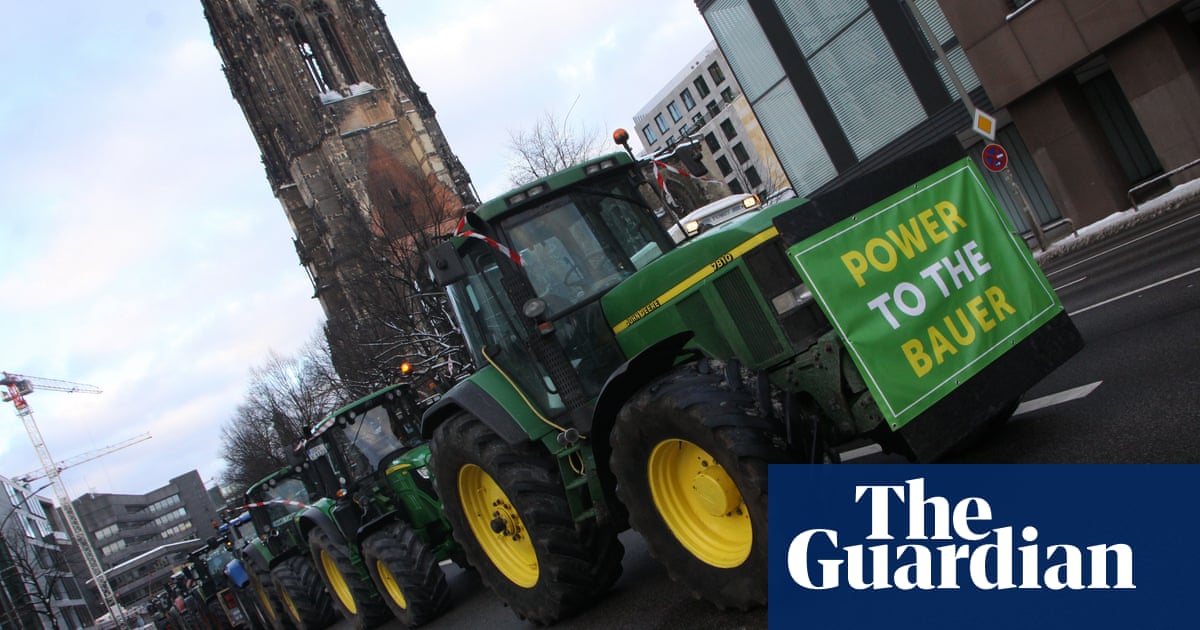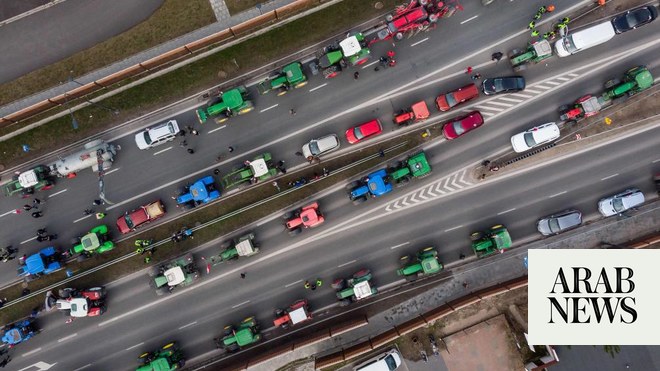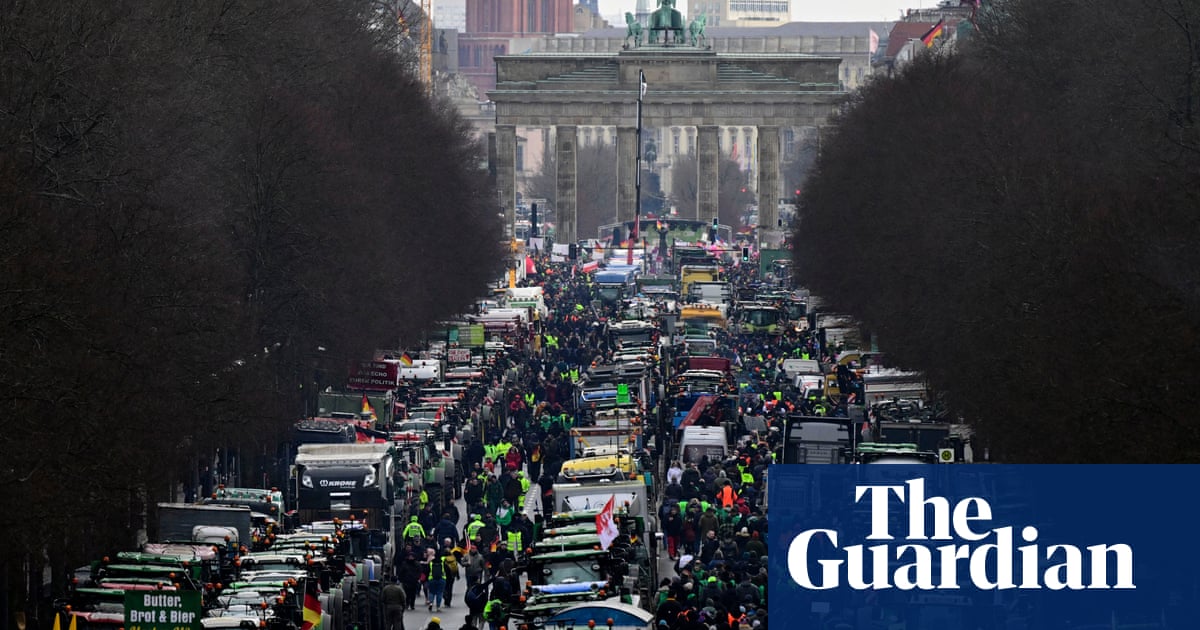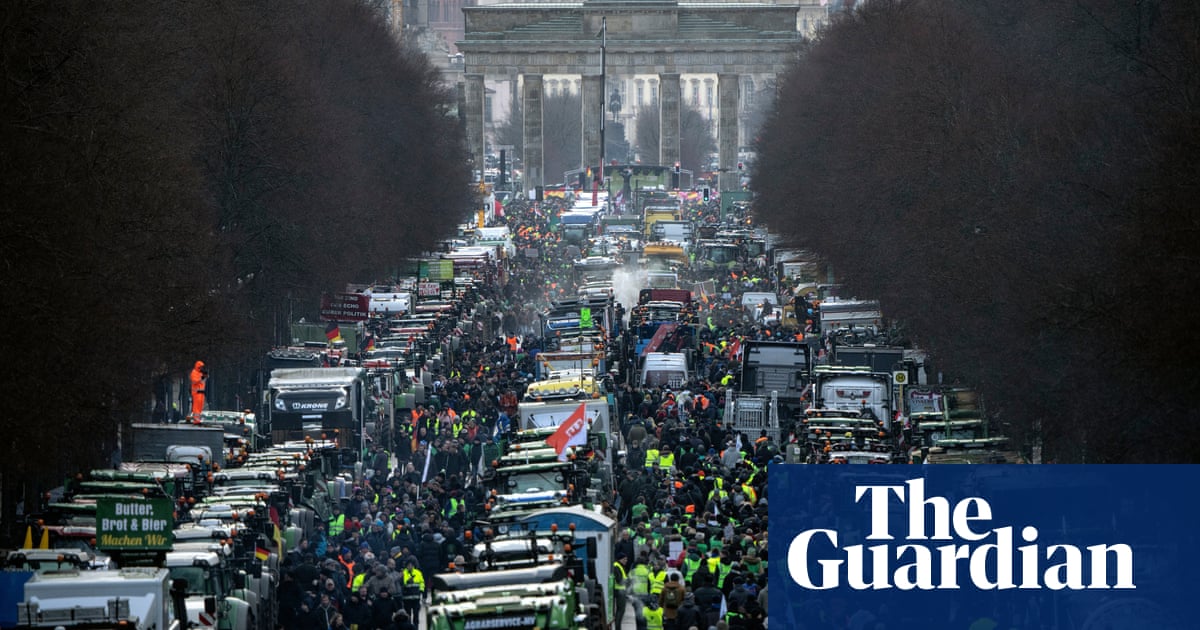
German farmers blocked city centres, highways and motorway slip roads with tractors at the start of a week-long, nationwide protest over planned cuts to agricultural sector subsidies that the government said could be co-opted by rightwing extremists.
“We are exercising our basic right to inform society and the political class that Germany needs a competitive agricultural sector,” the president of the German farmers’ association, Joachim Rukwied, told Stern magazine on Monday.
“That’s the only way to ensure the supply of high-quality, homegrown food,” Rukwied said, adding that the protests, which brought the centres of cities including Berlin, Hamburg, Cologne and Bremen to a near-standstill, could last all week.
Slow-moving tractor convoys and full-scale blockades hit traffic around the country before dawn, with authorities in the rural northern state of Mecklenburg-Western Pomerania announcing that all autobahn on and off ramps were blocked.
In several regions, farmers holding signs such as “No farmer, no future” and “Your policies are a declaration of war against farmers” were joined by hauliers protesting at a hefty increase in road tolls for heavy goods vehicles.
The vice-chancellor, Robert Habeck, whose return from holiday last week was disrupted by farmers trying to storm the ferry he was on, said in a video that fringe groups could exploit the farmers’ right to protest.
“Calls are circulating with coup fantasies, extremist groups are forming and ethnic-nationalist symbols are being openly displayed,” Habeck said.
Stephan Kramer, the head of the domestic intelligence agency in Thuringia, also warned of far-right infiltration.
In the past, extremist groups had “constantly and consistently tried to infiltrate every form of legitimate civil protest”, he told the Handelsblatt business daily, pointing to the 2015 migration crisis and the Covid-19 pandemic as examples.
In Dresden, the state capital of Saxony, figures from the ranks of the Free Saxons, a small rightwing extremist party founded in 2021, spoke at a rally outside the Semperoper opera house, the broadcaster MDR reported.
The Third Way, a neo-Nazi party formed by former members of the extremist NPD in 2013, also called for its supporters to protest with the farmers, while delegates from the far-right Alternative für Deutschland (AfD) reportedly joined a rally in Stuttgart.
Besides AfD, which is currently second in the polls behind the centre-right CDU opposition, a far-left politician, Sahra Wagenknecht, backed the protest, portraying it as proof of German voters’ deep dissatisfaction with the coalition government.
Wagenknecht, who formally founded a party named after herself on Monday that many observers think could take votes from AfD, said the government had “no plan other than taking ever more money out of pockets and … a chancellor who seems speechless even when he goes on and on”.
More than 2,000 tractors were registered for each inner-city demonstration. Farmers gathered in Berlin from late on Sunday evening at the Brandenburg Gate in the heart of the government district, already the scene of a large protest in December.
The protests went ahead despite a partial government U-turn last week. A tax discount for agricultural vehicles would be retained, Berlin promised, while a diesel subsidy would be phased out over three years rather than being axed immediately.
The unpopular three-party coalition headed by the chancellor, Olaf Scholz, infuriated farmers last month by announcing the subsidy cuts, part of an emergency package to find billions of euros in savings after the constitutional court ruled the 2024 budget was illegal.
The farmers’ association said it was still insisting on the plans being reversed in full and would go ahead with its planned week of action. Some farmers said they stood to lose as much as €10,000 (£8,600) a year from the cuts.
The government said on Monday it was not considering further changes to the phase-out of agricultural subsidies. “In the end, a government has to decide and has to lead the way, and that can’t always be to everyone’s satisfaction,” a spokesperson said.
Farmers and hauliers have been the first groups to protest in what could become an unprecedented wave of cross-sector industrial action as Germany’s economy, long the powerhouse of Europe, struggles with a damaging combination of short-term and structural problems.
On Sunday, the train drivers’ union GDL announced further strike action – starting with freight on Tuesday, extending to passenger trains on Wednesday, and lasting until Friday – after talks with the state-owned rail operator, Deutsche Bahn (DB), failed.
The two sides have been trying to agree on a deal on working hours, which GDL wants cut from 38 to 35 a week without a reduction in salary, and a €555 (£480) a month pay rise. The union has already staged 20- and 24-hour strikes in support of its claims.
Martin Seiler, DB’s chief human resources officer, said the strike was “not only completely unnecessary, but we also consider it legally inadmissible”. The operator was prepared to compromise, he said, but if necessary would ask for an injunction.












